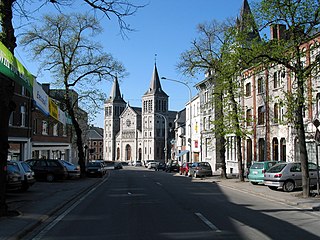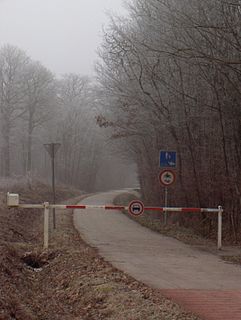
Rochefort is a Walloon municipality located in the Belgian province of Namur, close to the Ardennes. On 1 January 2006, Rochefort had a total population of 12,038. The total area is 165.27 km² which gives a population density of 73 inhabitants per km². It was a resort in the 19th century.

Amayé-sur-Seulles is a commune in the Calvados department in the Normandy region of northwestern France.

Auberville is a commune in the Calvados department in the Normandy region of north-western France.

Villers-sur-Mer is a commune in the Calvados department in Normandy, northwestern France, with a population of 2,765 as of 2016.

The Lesse is a river in the Ardennes, in the Walloon region of Belgium. It is a right tributary to the river Meuse.

Naulette, French: Caverne de la Naulette is a large cave on the left bank of the Lesse, a tributary of the Meuse in the hills above Dinant, Belgium.

Villers-Bretonneux is a commune in the Somme department in Hauts-de-France in northern France.
The Royal Trust was a donation to the state proposed in a letter by King Leopold II of Belgium on 9 April 1900. In addition some properties were added to the donation in a letter of 15 November 1900. The Belgian government accepted the donation by law on 31 December 1903. When the King handed the Congo Free State over to the Belgian government on 28 November 1907, additional properties were added to the Royal Trust.

Han-sur-Lesse is a Walloon village in the municipality of Rochefort, Namur Province in southeastern Belgium. It is famous for the exceptional caves carved under a nearby hill by the river Lesse, which tourists reach via a preserved remnant of the country's vicinal tramway system.
The Caves of Han-sur-Lesse are a major Belgian tourist attraction located on the outskirts of the village of Han-sur-Lesse.
Villers-sur-Semois Castle is a castle in Villers-sur-Semois in the municipality of Étalle in the province of Luxembourg, Belgium.

Famenne is a natural region in southern Belgium. Together with The Fagne or la Fagne, west of the river Meuse, it is part of the Fagne-Famenne natural region. The two regions are often grouped together because they are quite similar both geographically and naturally.
The Communauté de communes du Saulnois is a federation of municipalities of the rural Saulnois region, located in the department of Moselle in Eastern France. It consists of 128 communes. Its seat is in Château-Salins.

RAVeL, French for réseau autonome de voies lentes, is a Walloon initiative aimed at creating a network of itineraries reserved for pedestrians, cyclists, horse riders and people with reduced mobility.
Elie Lainé (1829-1911) was a French landscape architect, chiefly remembered for the restoration of the gardens at Vaux le Vicomte, the layout of the grounds at Waddesdon Manor and the creation of numerous parks and gardens for Léopold II, the king of Belgium.

The arrondissement of Sarrebourg-Château-Salins is an arrondissement of France in the Moselle department in the Grand Est region. It has 230 communes. Its population is 92,282 (2016), and its area is 1,966.9 km2 (759.4 sq mi).
The canton of Le Saulnois is an administrative division of the Moselle department, northeastern France. Its borders were modified at the French canton reorganisation which came into effect in March 2015. Its seat is in Château-Salins.












